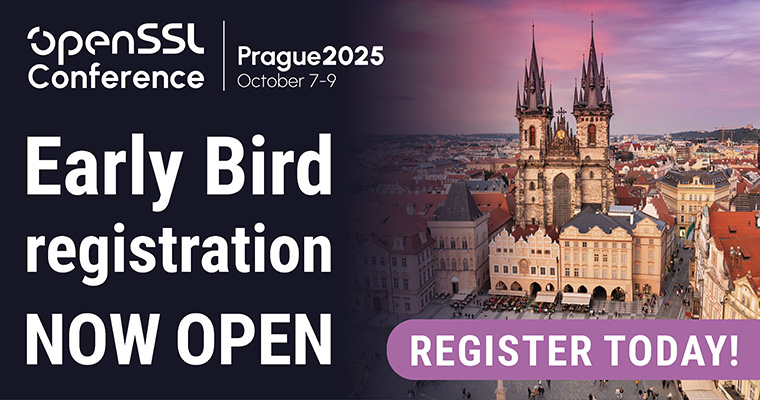Release Announcement for OpenSSL 3.6.0
The final release of OpenSSL 3.6 is now live. We would like to thank all those who contributed to the OpenSSL 3.6 release, without whom the OpenSSL Library would not be possible.
The final release of OpenSSL 3.6 is now live. We would like to thank all those who contributed to the OpenSSL 3.6 release, without whom the OpenSSL Library would not be possible.
Release Announcement for OpenSSL Library 3.5.4, 3.4.3, 3.3.5, 3.2.6, 3.0.18, 1.1.1zd and 1.0.2zm
The OpenSSL Project team announces the release of new versions of our open-source toolkit for SSL/TLS.
Among the 91 PRs approved in August, 6 were from people who hadn’t contributed to OpenSSL’s code base until now.
| author | date | PR |
|---|---|---|
| zl523856 | 2025-08-03 | [RISC-V] Further optimization for AES-128-CBC decryption performance |
| ChillerDragon | 2025-08-04 | Improve english in endian comment |
| ritoban23 | 2025-08-13 | Fix potential null pointer dereference in pkey_dh_derive |
| vkryl | 2025-08-15 | Android: Enable 16 KB ELF alignment for arm64-v8a and x86_64 platforms |
| itot1198 | 2025-08-18 | Remove unnecessary fetch-depth in GitHub Actions workflow |
| Leonabcd123 | 2025-08-28 | Fixed typo |
zl523856 started by submitting an issue that asking about the proposed change. The pull request includes some assembly code that improves the performance of the AES-128-CBC decryption algorithm on the RISC-V architecture. It’s not the sort of code that just anyone can write. Open source projects, such as OpenSSL, can benefit from one-time contributions of expertise. In turn, anyone who uses OpenSSL or products that include the library also benefit. It’s a beautiful thing.
Release Announcement for OpenSSL Library 3.5.3
The OpenSSL Project team announces the release of new versions of our open-source toolkit for SSL/TLS.
The OpenSSL Project is pleased to announce that OpenSSL 3.6 Beta1 pre-release is available, adding significant functionality to the OpenSSL Library.
The OpenSSL Project is pleased to announce that OpenSSL 3.6 Alpha1 pre-release is released and adding significant new functionality to OpenSSL Library.
In July, 58 pull requests were approved for merge into the OpenSSL Library code base. There were also four people who contributed code for the first time:
So far in the development cycle of OpenSSL 3.6, the plurality of changes come from developers paid by either the OpenSSL Corporation or Foundation. But individual contributions continue to make up a large proportion of commits (41%) and overall changes (28%). Additionally individual committers also have done 18.5% of reviews so far.

Early Bird registration is now open for the inaugural OpenSSL Conference, taking place from October 7 to 9, 2025, in Prague, Czech Republic. Take advantage of exclusive Early Bird rates and secure your spot now!
Join the global community of cryptographers, open-source innovators, security experts, and thought leaders who shape the future of secure communications. The OpenSSL Conference promises to be a landmark event, uniting diverse perspectives from across technical, enterprise, academic, and regulatory fields.
The freeze date for OpenSSL 3.6 Alpha is rapidly approaching. If you have a feature ready, please ensure that your associated PRs are posted, reviewed, and ready to be merged before the include/exclude decision date (Tuesday, August 5, 2025) and merged before the repository freeze date (Tuesday, August 19, 2025). Otherwise, the feature will be postponed until the next release.
Every month the OpenSSL Library receives code in the form of pull requests (PR) to GitHub. In June, 64 of those PRs were merged into the default branch of the repository thus becoming a part of the OpenSSL Library code base. Some of those changes came from developers paid by either the OpenSSL Foundation or the OpenSSL Corporation. Some of the changes come from developers who work for another company. And some, ~40% so far in 2025, come from individuals.